Marshall Hodgson. Rethinking World History: Essays on Europe, Islam and World History
Подождите немного. Документ загружается.

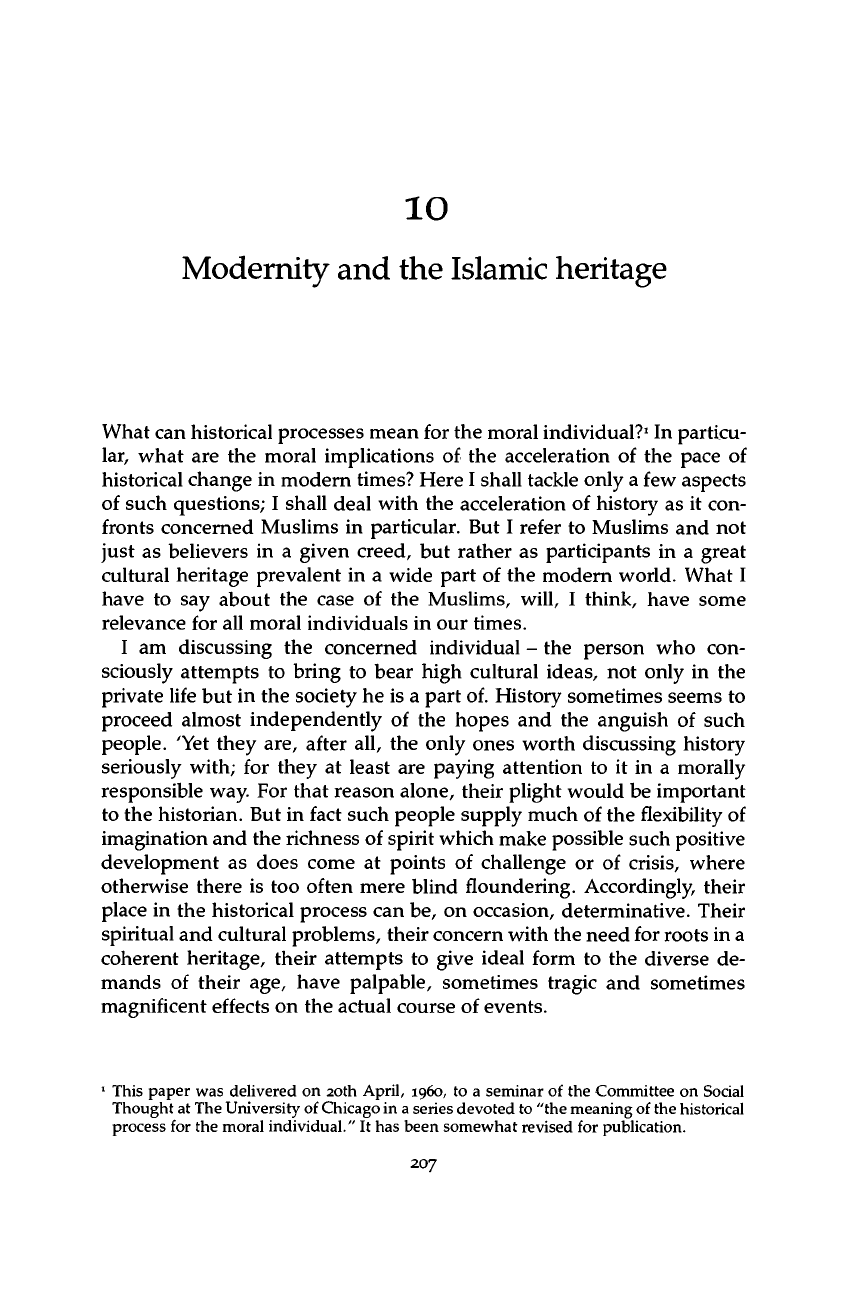
10
Modernity and the Islamic heritage
What can historical processes mean for the moral individual?
1
In particu-
lar, what are the moral implications of the acceleration of the pace of
historical change in modern times? Here I shall tackle only a few aspects
of such questions; I shall deal with the acceleration of history as it con-
fronts concerned Muslims in particular. But I refer to Muslims and not
just as believers in a given creed, but rather as participants in a great
cultural heritage prevalent in a wide part of the modern world. What I
have to say about the case of the Muslims, will, I think, have some
relevance for all moral individuals in our times.
I am discussing the concerned individual - the person who con-
sciously attempts to bring to bear high cultural ideas, not only in the
private life but in the society he is a part of. History sometimes seems to
proceed almost independently of the hopes and the anguish of such
people. 'Yet they are, after all, the only ones worth discussing history
seriously with; for they at least are paying attention to it in a morally
responsible way. For that reason alone, their plight would be important
to the historian. But in fact such people supply much of the flexibility of
imagination and the richness of spirit which make possible such positive
development as does come at points of challenge or of crisis, where
otherwise there is too often mere blind floundering. Accordingly, their
place in the historical process can be, on occasion, determinative. Their
spiritual and cultural problems, their concern with the need for roots in a
coherent heritage, their attempts to give ideal form to the diverse de-
mands of their age, have palpable, sometimes tragic and sometimes
magnificent effects on the actual course of events.
This paper was delivered on 20th April, 1960, to a seminar of the Committee on Social
Thought at The University of Chicago in a series devoted to "the meaning of the historical
process for the moral individual." It has been somewhat revised for publication.
207
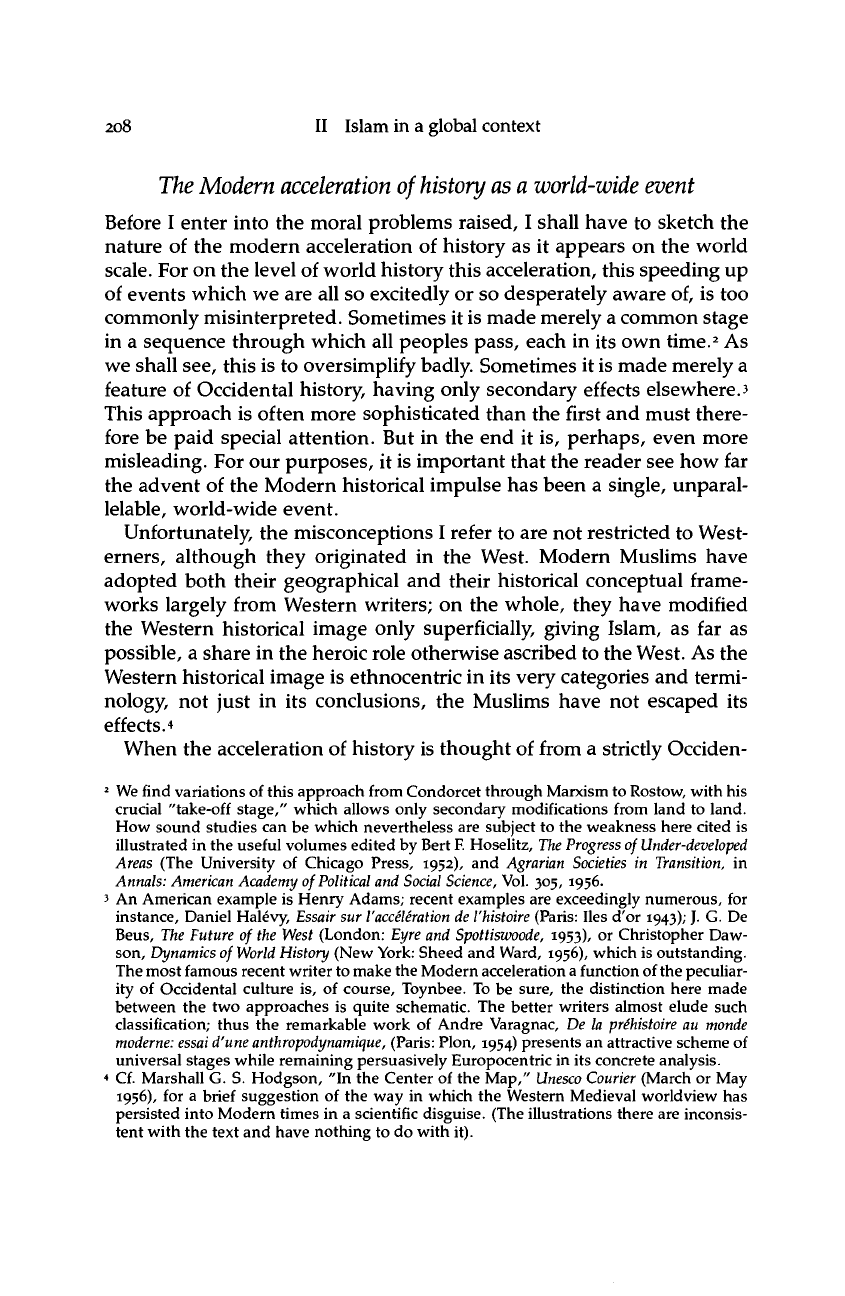
2o8 II Islam in a global context
The Modern
acceleration
of
history as
a
world-wide
event
Before I enter into the moral problems raised, I shall have to sketch the
nature of the modern acceleration of history as it appears on the world
scale. For on the level of world history this acceleration, this speeding up
of events which we are all so excitedly or so desperately aware of, is too
commonly misinterpreted. Sometimes it is made merely a common stage
in a sequence through which all peoples pass, each in its own time.
2
As
we shall see, this is to oversimplify badly. Sometimes it is made merely a
feature of Occidental history, having only secondary effects elsewhere.3
This approach is often more sophisticated than the first and must there-
fore be paid special attention. But in the end it is, perhaps, even more
misleading. For our purposes, it is important that the reader see how far
the advent of the Modern historical impulse has been a single, unparal-
lelable, world-wide event.
Unfortunately, the misconceptions I refer to are not restricted to West-
erners, although they originated in the West. Modern Muslims have
adopted both their geographical and their historical conceptual frame-
works largely from Western writers; on the whole, they have modified
the Western historical image only superficially, giving Islam, as far as
possible, a share in the heroic role otherwise ascribed to the West. As the
Western historical image is ethnocentric in its very categories and termi-
nology, not just in its conclusions, the Muslims have not escaped its
effects. 4
When the acceleration of history is thought of from a strictly Occiden-
2
We find variations of this approach from Condorcet through Marxism to Rostow, with his
crucial "take-off stage/' which allows only secondary modifications from land to land.
How sound studies can be which nevertheless are subject to the weakness here cited is
illustrated in the useful volumes edited by Bert
F.
Hoselitz,
The Progress of Under-developed
Areas (The University of Chicago Press, 1952), and
Agrarian Societies
in
Transition,
in
Annals:
American Academy of Political and Social
Science,
Vol. 305, 1956.
3 An American example is Henry Adams; recent examples are exceedingly numerous, for
instance, Daniel Halevy,
Essair
sur
Vacceleration de Vhistoire
(Paris: lies d'or 1943); J. G. De
Beus,
The Future
of
the West
(London:
Eyre and
Spottiswoode,
1953), or Christopher Daw-
son,
Dynamics of World History
(New York: Sheed and Ward, 1956), which is outstanding.
The most famous recent writer to make the Modern acceleration
a
function of the peculiar-
ity of Occidental culture is, of course, Toynbee. To be sure, the distinction here made
between the two approaches is quite schematic. The better writers almost elude such
classification; thus the remarkable work of Andre Varagnac, De la
prehistoire
au
monde
moderne:
essai
d'une
anthropodynamique,
(Paris: Plon, 1954) presents an attractive scheme of
universal stages while remaining persuasively Europocentric in its concrete analysis.
4 Cf. Marshall G. S. Hodgson, "In the Center of the Map,"
Unesco Courier
(March or May
1956),
for a brief suggestion of the way in which the Western Medieval worldview has
persisted into Modern times in a scientific disguise. (The illustrations there are inconsis-
tent with the text and have nothing to do with it).
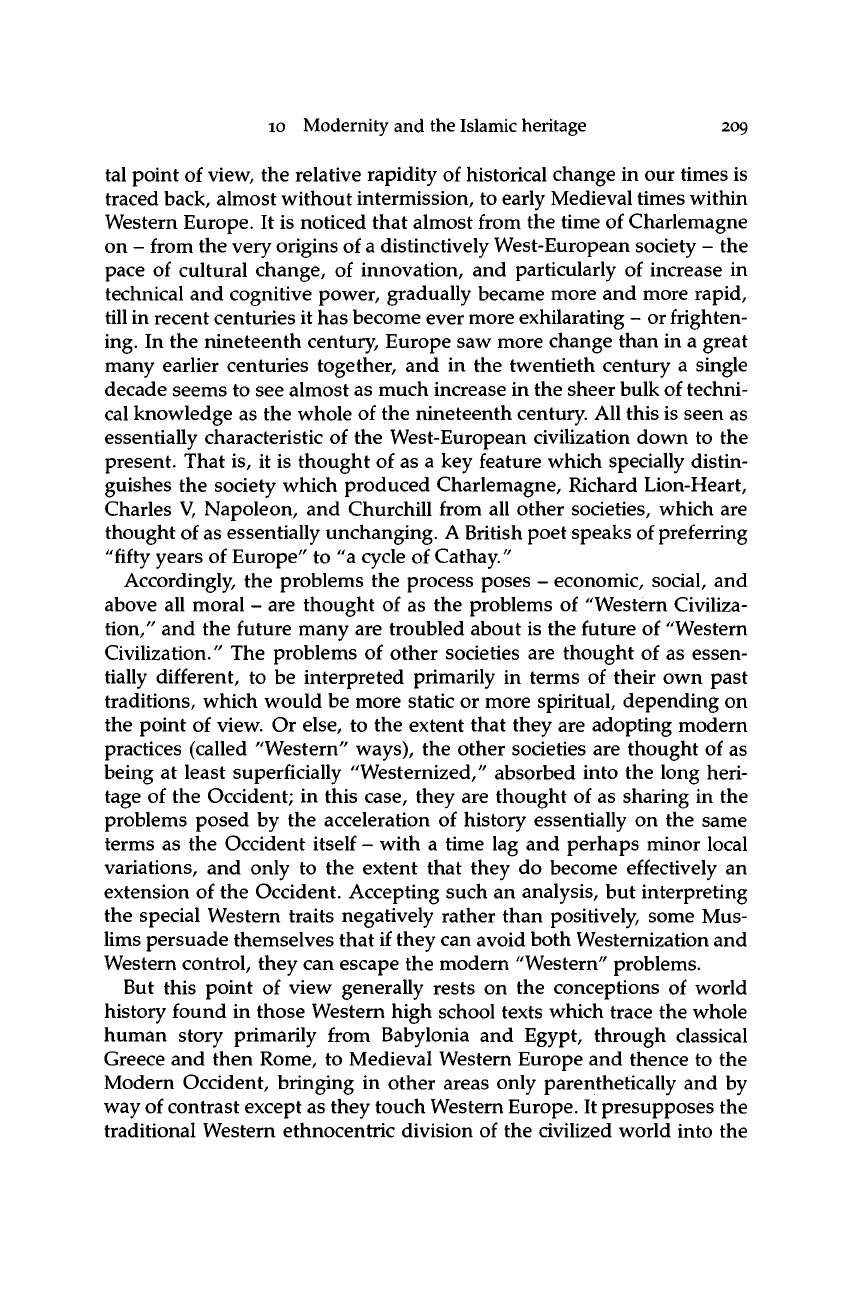
io Modernity and the Islamic heritage 209
tal point
of
view,
the
relative rapidity
of
historical change
in our
times
is
traced back, almost without intermission, to early Medieval times within
Western Europe.
It is
noticed that almost from the time
of
Charlemagne
on
-
from the very origins
of
a distinctively West-European society
- the
pace
of
cultural change,
of
innovation,
and
particularly
of
increase
in
technical
and
cognitive power, gradually became more
and
more rapid,
till in recent centuries
it
has become ever more exhilarating
-
or frighten-
ing.
In the
nineteenth century, Europe saw more change than
in a
great
many earlier centuries together,
and in the
twentieth century
a
single
decade seems
to
see almost as much increase
in
the sheer bulk
of
techni-
cal knowledge
as
the whole
of
the nineteenth century. All this
is
seen
as
essentially characteristic
of the
West-European civilization down
to the
present. That is,
it is
thought
of as a key
feature which specially distin-
guishes
the
society which produced Charlemagne, Richard Lion-Heart,
Charles V, Napoleon,
and
Churchill from
all
other societies, which
are
thought
of
as essentially unchanging. A British poet speaks
of
preferring
"fifty years
of
Europe"
to "a
cycle
of
Cathay."
Accordingly,
the
problems
the
process poses
-
economic, social,
and
above
all
moral
-
are thought
of as the
problems
of
"Western Civiliza-
tion,"
and the
future many are troubled about
is the
future
of
"Western
Civilization."
The
problems
of
other societies
are
thought
of as
essen-
tially different,
to be
interpreted primarily
in
terms
of
their
own
past
traditions, which would
be
more static
or
more spiritual, depending
on
the point
of
view.
Or
else,
to the
extent that they
are
adopting modern
practices (called "Western" ways),
the
other societies
are
thought
of as
being
at
least superficially "Westernized," absorbed into
the
long heri-
tage
of the
Occident;
in
this case, they
are
thought
of as
sharing
in the
problems posed
by the
acceleration
of
history essentially
on the
same
terms
as the
Occident itself
-
with
a
time
lag and
perhaps minor local
variations,
and
only
to the
extent that they
do
become effectively
an
extension
of
the Occident. Accepting such
an
analysis,
but
interpreting
the special Western traits negatively rather than positively, some Mus-
lims persuade themselves that
if
they can avoid both Westernization and
Western control, they can escape the modern "Western" problems.
But this point
of
view generally rests
on the
conceptions
of
world
history found
in
those Western high school texts which trace
the
whole
human story primarily from Babylonia
and
Egypt, through classical
Greece
and
then Rome,
to
Medieval Western Europe
and
thence
to the
Modern Occident, bringing
in
other areas only parenthetically
and by
way
of
contrast except as they touch Western Europe. It presupposes the
traditional Western ethnocentric division
of the
civilized world into
the
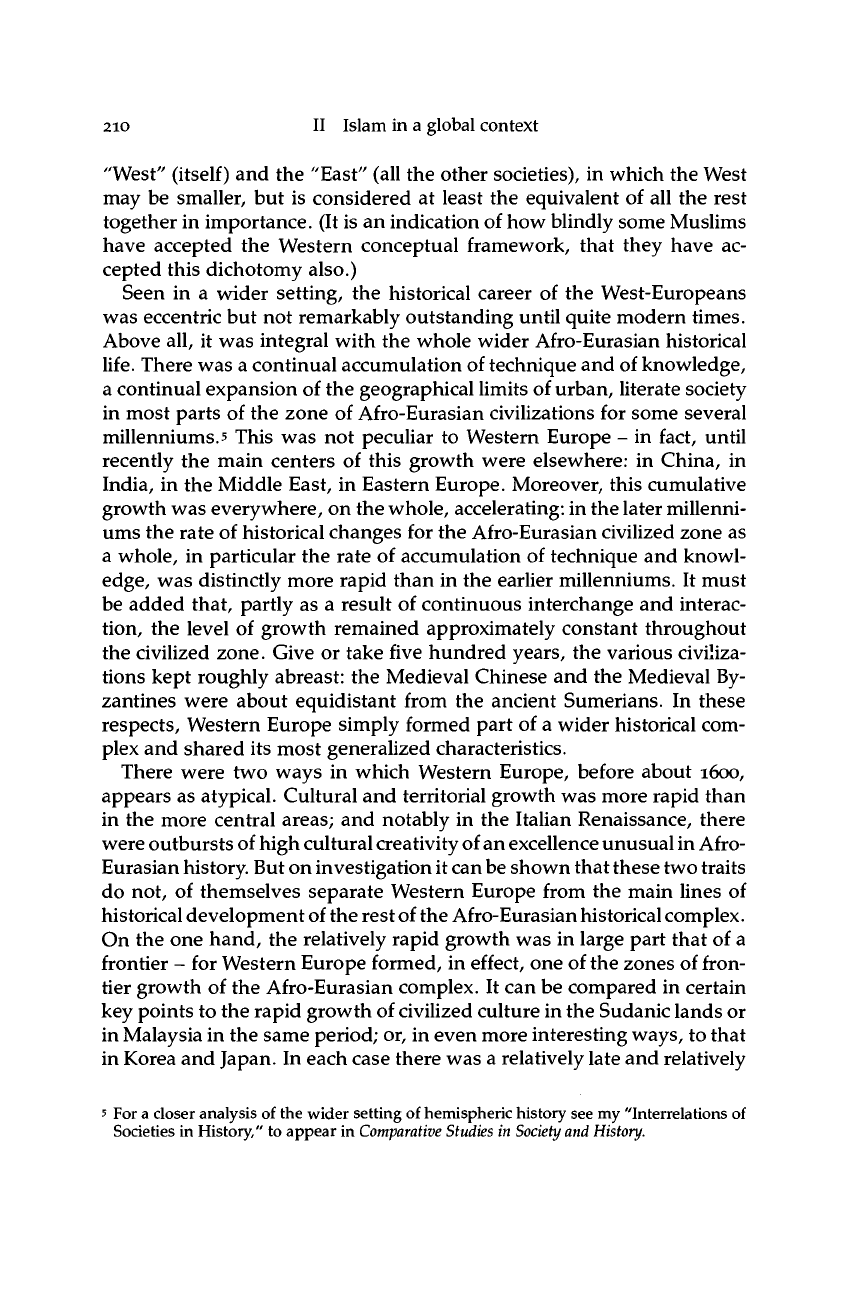
210 II Islam in a global context
"West" (itself)
and the
"East"
(all the
other societies),
in
which
the
West
may
be
smaller,
but is
considered
at
least
the
equivalent
of all the
rest
together
in
importance.
(It
is
an
indication
of
how blindly some Muslims
have accepted
the
Western conceptual framework, that they have
ac-
cepted this dichotomy also.)
Seen
in a
wider setting,
the
historical career
of the
West-Europeans
was eccentric
but not
remarkably outstanding until quite modern times.
Above
all, it was
integral with
the
whole wider Afro-Eurasian historical
life.
There was
a
continual accumulation
of
technique
and of
knowledge,
a continual expansion
of the
geographical limits
of
urban, literate society
in most parts
of the
zone
of
Afro-Eurasian civilizations
for
some several
millenniums.5 This
was not
peculiar
to
Western Europe
- in
fact, until
recently
the
main centers
of
this growth were elsewhere:
in
China,
in
India,
in the
Middle East,
in
Eastern Europe. Moreover, this cumulative
growth was everywhere,
on
the whole, accelerating:
in
the later millenni-
ums
the
rate
of
historical changes
for the
Afro-Eurasian civilized zone
as
a whole,
in
particular
the
rate
of
accumulation
of
technique
and
knowl-
edge,
was
distinctly more rapid than
in the
earlier millenniums.
It
must
be added that, partly
as a
result
of
continuous interchange
and
interac-
tion,
the
level
of
growth remained approximately constant throughout
the civilized zone. Give
or
take five hundred years,
the
various civiliza-
tions kept roughly abreast:
the
Medieval Chinese
and the
Medieval
By-
zantines were about equidistant from
the
ancient Sumerians.
In
these
respects, Western Europe simply formed part
of a
wider historical
com-
plex
and
shared
its
most generalized characteristics.
There were
two
ways
in
which Western Europe, before about
1600,
appears
as
atypical. Cultural
and
territorial growth was more rapid than
in
the
more central areas;
and
notably
in the
Italian Renaissance, there
were outbursts of high cultural creativity of an excellence unusual in Afro-
Eurasian
history.
But on investigation it can
be
shown that these two traits
do
not, of
themselves separate Western Europe from
the
main lines
of
historical development of the rest of the Afro-Eurasian historical complex.
On
the one
hand,
the
relatively rapid growth
was in
large part that
of a
frontier
- for
Western Europe formed,
in
effect,
one of
the zones
of
fron-
tier growth
of the
Afro-Eurasian complex.
It can be
compared
in
certain
key points
to the
rapid growth
of
civilized culture
in
the Sudanic lands
or
in Malaysia
in the
same period;
or, in
even more interesting ways,
to
that
in Korea
and
Japan.
In
each case there was
a
relatively late
and
relatively
5 For
a
closer analysis
of the
wider setting
of
hemispheric history see
my
"Interrelations of
Societies
in
History/'
to
appear
in
Comparative Studies
in
Society and History.
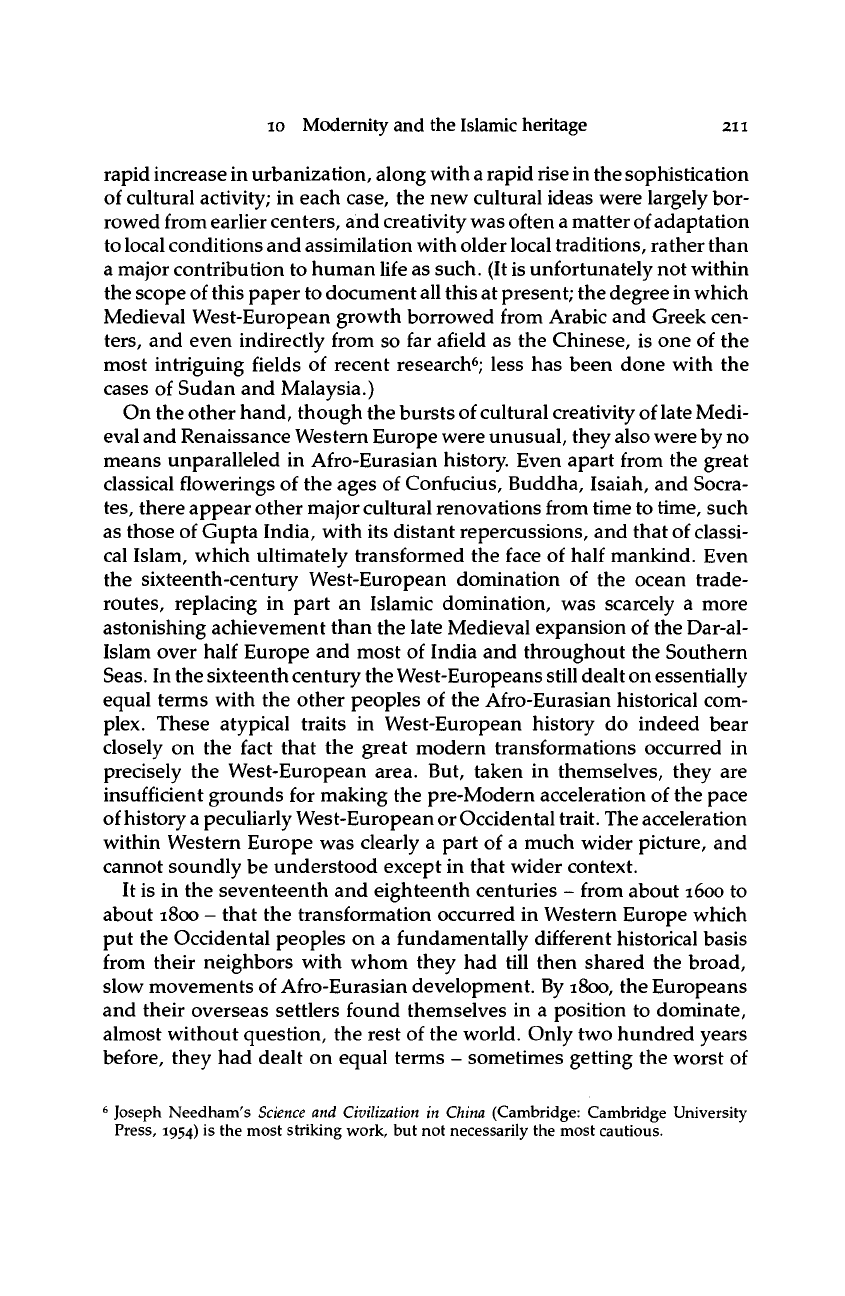
io Modernity and the Islamic heritage 211
rapid increase in urbanization, along with
a
rapid rise in the sophistication
of cultural activity; in each case, the new cultural ideas were largely bor-
rowed from earlier
centers,
and creativity was often
a
matter of adaptation
to local conditions and assimilation with older
local
traditions, rather than
a major contribution to human life as such. (It is unfortunately not within
the scope of this paper to document
all
this at present; the degree in which
Medieval West-European growth borrowed from Arabic and Greek cen-
ters,
and even indirectly from so far afield as the Chinese, is one of the
most intriguing fields of recent research
6
; less has been done with the
cases of Sudan and Malaysia.)
On the other hand, though the bursts of cultural creativity of
late
Medi-
eval and Renaissance Western Europe were unusual, they also were by no
means unparalleled in Afro-Eurasian history. Even apart from the great
classical flowerings of the ages of Confucius, Buddha, Isaiah, and Socra-
tes,
there appear other major cultural renovations from time to time, such
as those of Gupta India, with its distant repercussions, and that of classi-
cal Islam, which ultimately transformed the face of half mankind. Even
the sixteenth-century West-European domination of the ocean trade-
routes, replacing in part an Islamic domination, was scarcely a more
astonishing achievement than the late Medieval expansion of the Dar-al-
Islam over half Europe and most of India and throughout the Southern
Seas.
In the sixteenth century the West-Europeans still dealt on essentially
equal terms with the other peoples of the Afro-Eurasian historical com-
plex. These atypical traits in West-European history do indeed bear
closely on the fact that the great modern transformations occurred in
precisely the West-European area. But, taken in themselves, they are
insufficient grounds for making the pre-Modern acceleration of the pace
of history
a
peculiarly West-European or Occidental trait. The acceleration
within Western Europe was clearly a part of a much wider picture, and
cannot soundly be understood except in that wider context.
It is in the seventeenth and eighteenth centuries - from about 1600 to
about 1800 - that the transformation occurred in Western Europe which
put the Occidental peoples on a fundamentally different historical basis
from their neighbors with whom they had till then shared the broad,
slow movements of Afro-Eurasian development. By 1800, the Europeans
and their overseas settlers found themselves in a position to dominate,
almost without question, the rest of the world. Only two hundred years
before, they had dealt on equal terms - sometimes getting the worst of
6
Joseph Needham's
Science
and
Civilization
in
China
(Cambridge: Cambridge University
Press,
1954) is the most striking work, but not necessarily the most cautious.
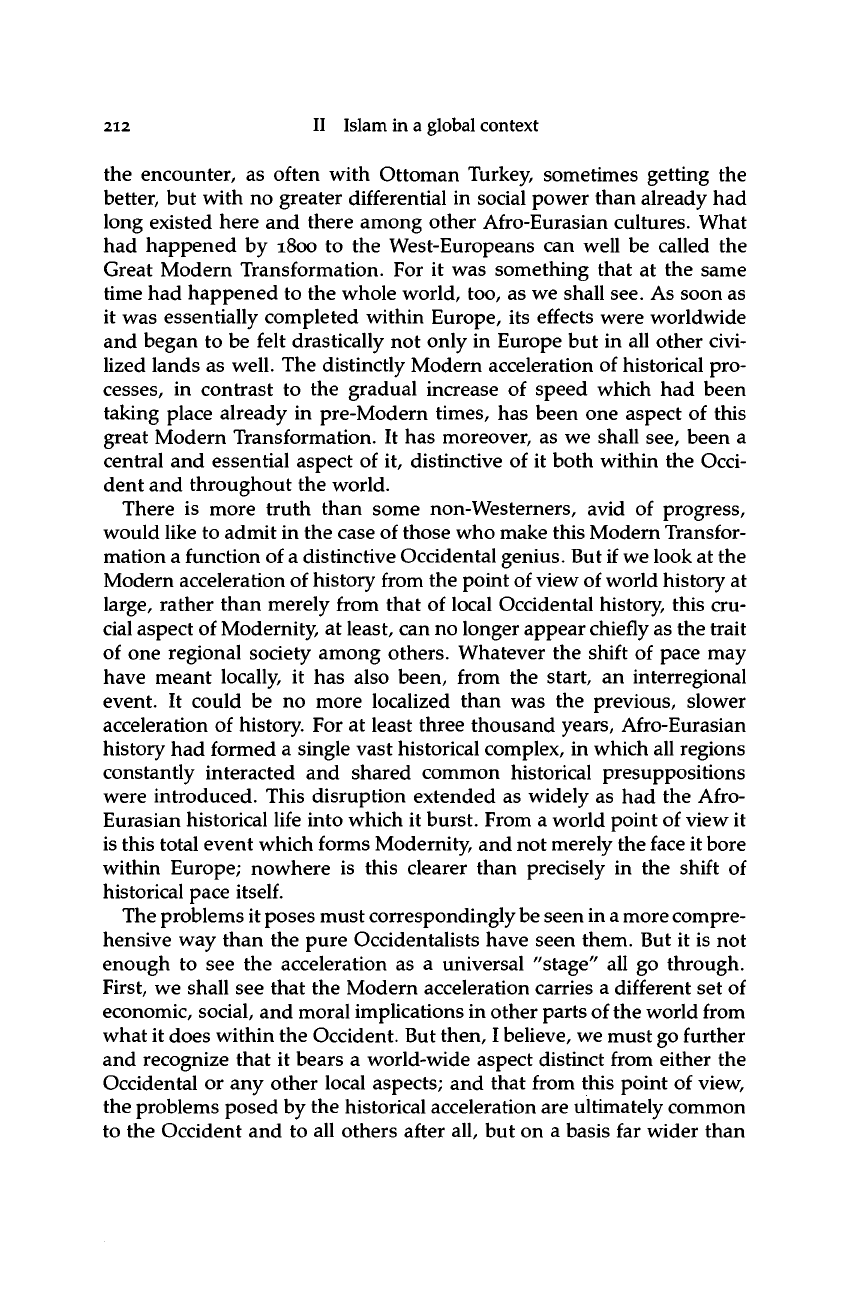
212 II Islam in a global context
the encounter,
as
often with Ottoman Turkey, sometimes getting
the
better,
but
with
no
greater differential
in
social power than already
had
long existed here
and
there among other Afro-Eurasian cultures. What
had happened
by 1800 to the
West-Europeans
can
well
be
called
the
Great Modern Transformation.
For it was
something that
at the
same
time
had
happened
to the
whole world, too,
as we
shall see.
As
soon
as
it
was
essentially completed within Europe,
its
effects were worldwide
and began
to be
felt drastically
not
only
in
Europe
but in all
other civi-
lized lands
as
well.
The
distinctly Modern acceleration
of
historical pro-
cesses,
in
contrast
to the
gradual increase
of
speed which
had
been
taking place already
in
pre-Modern times,
has
been
one
aspect
of
this
great Modern Transformation.
It has
moreover,
as we
shall
see,
been
a
central
and
essential aspect
of it,
distinctive
of it
both within
the
Occi-
dent
and
throughout
the
world.
There
is
more truth than some non-Westerners, avid
of
progress,
would like
to
admit
in the
case
of
those who make this Modern Transfor-
mation
a
function
of
a distinctive Occidental genius. But
if
we look
at the
Modern acceleration
of
history from the point
of
view
of
world history
at
large, rather than merely from that
of
local Occidental history, this
cru-
cial aspect
of
Modernity,
at
least, can
no
longer appear chiefly as
the
trait
of
one
regional society among others. Whatever
the
shift
of
pace
may
have meant locally,
it has
also been, from
the
start,
an
interregional
event.
It
could
be no
more localized than
was the
previous, slower
acceleration
of
history.
For at
least three thousand years, Afro-Eurasian
history
had
formed
a
single vast historical complex,
in
which
all
regions
constantly interacted
and
shared common historical presuppositions
were introduced. This disruption extended
as
widely
as had the
Afro-
Eurasian historical life into which
it
burst. From
a
world point
of
view
it
is this total event which forms Modernity,
and
not merely the face
it
bore
within Europe; nowhere
is
this clearer than precisely
in the
shift
of
historical pace
itself.
The problems it poses must correspondingly be seen in a more compre-
hensive
way
than
the
pure Occidentalists have seen them.
But it is not
enough
to see the
acceleration
as a
universal "stage"
all go
through.
First,
we
shall
see
that
the
Modern acceleration carries
a
different
set of
economic, social,
and
moral implications
in
other parts
of
the world from
what
it
does within the Occident. But then,
I
believe, we must go further
and recognize that
it
bears
a
world-wide aspect distinct from either
the
Occidental
or any
other local aspects;
and
that from this point
of
view,
the problems posed
by the
historical acceleration are ultimately common
to
the
Occident
and to all
others after all,
but on a
basis
far
wider than
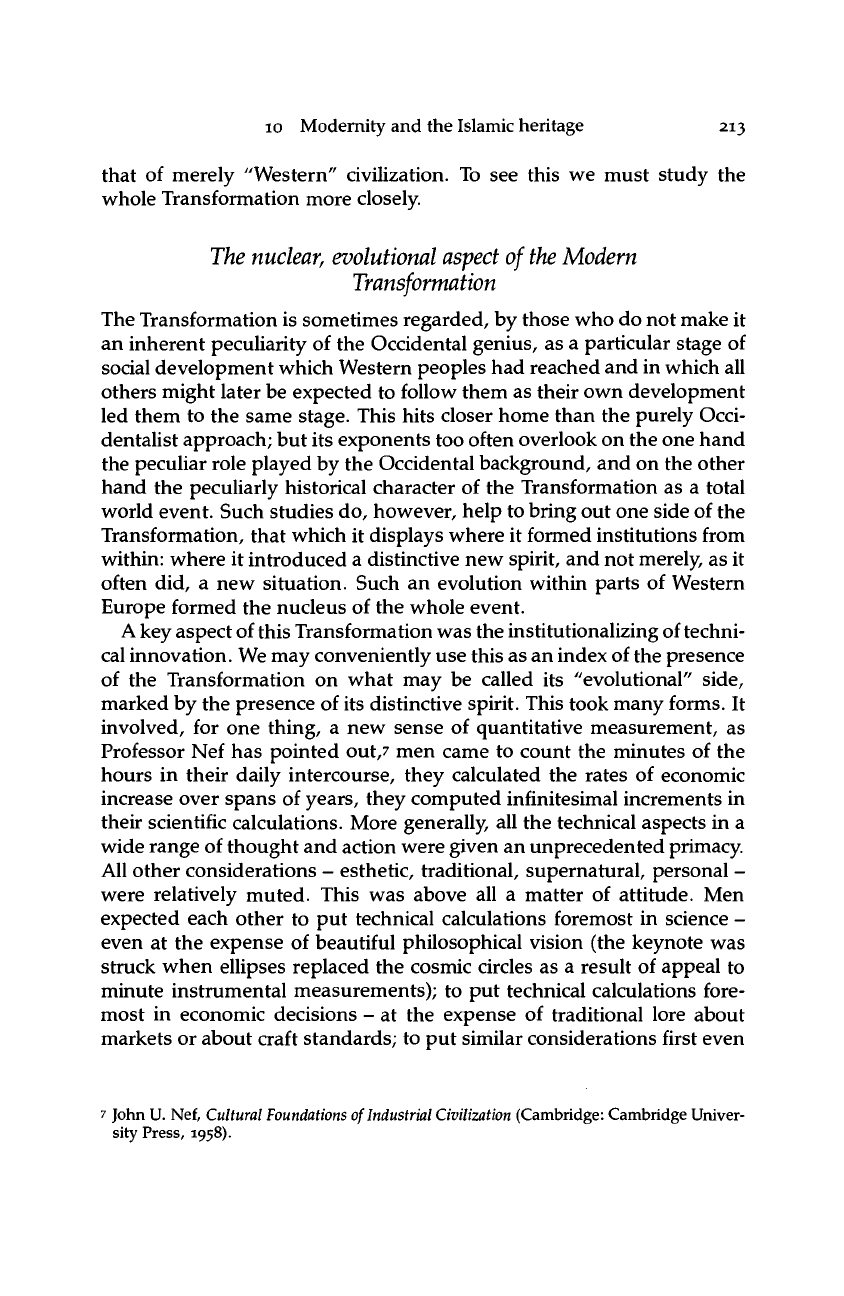
io Modernity and the Islamic heritage 213
that of merely "Western" civilization. To see this we must study the
whole Transformation more closely.
The
nuclear,
evolutional aspect
of
the
Modern
Transformation
The Transformation is sometimes regarded, by those who do not make it
an inherent peculiarity of the Occidental genius, as a particular stage of
social development which Western peoples had reached and in which all
others might later be expected to follow them as their own development
led them to the same stage. This hits closer home than the purely Occi-
dentalist approach; but its exponents too often overlook on the one hand
the peculiar role played by the Occidental background, and on the other
hand the peculiarly historical character of the Transformation as a total
world event. Such studies do, however, help to bring out one side of the
Transformation, that which it displays where it formed institutions from
within: where it introduced a distinctive new spirit, and not merely, as it
often did, a new situation. Such an evolution within parts of Western
Europe formed the nucleus of the whole event.
A
key aspect of this Transformation was the institutionalizing of techni-
cal innovation. We may conveniently use this as an index of the presence
of the Transformation on what may be called its "evolutional" side,
marked by the presence of its distinctive spirit. This took many forms. It
involved, for one thing, a new sense of quantitative measurement, as
Professor Nef has pointed out,7 men came to count the minutes of the
hours in their daily intercourse, they calculated the rates of economic
increase over spans of years, they computed infinitesimal increments in
their scientific calculations. More generally, all the technical aspects in a
wide range of thought and action were given an unprecedented primacy.
All other considerations - esthetic, traditional, supernatural, personal -
were relatively muted. This was above all a matter of attitude. Men
expected each other to put technical calculations foremost in science -
even at the expense of beautiful philosophical vision (the keynote was
struck when ellipses replaced the cosmic circles as a result of appeal to
minute instrumental measurements); to put technical calculations fore-
most in economic decisions - at the expense of traditional lore about
markets or about craft standards; to put similar considerations first even
7 John U. Nef, Cultural
Foundations of Industrial
Civilization (Cambridge: Cambridge Univer-
sity Press, 1958).
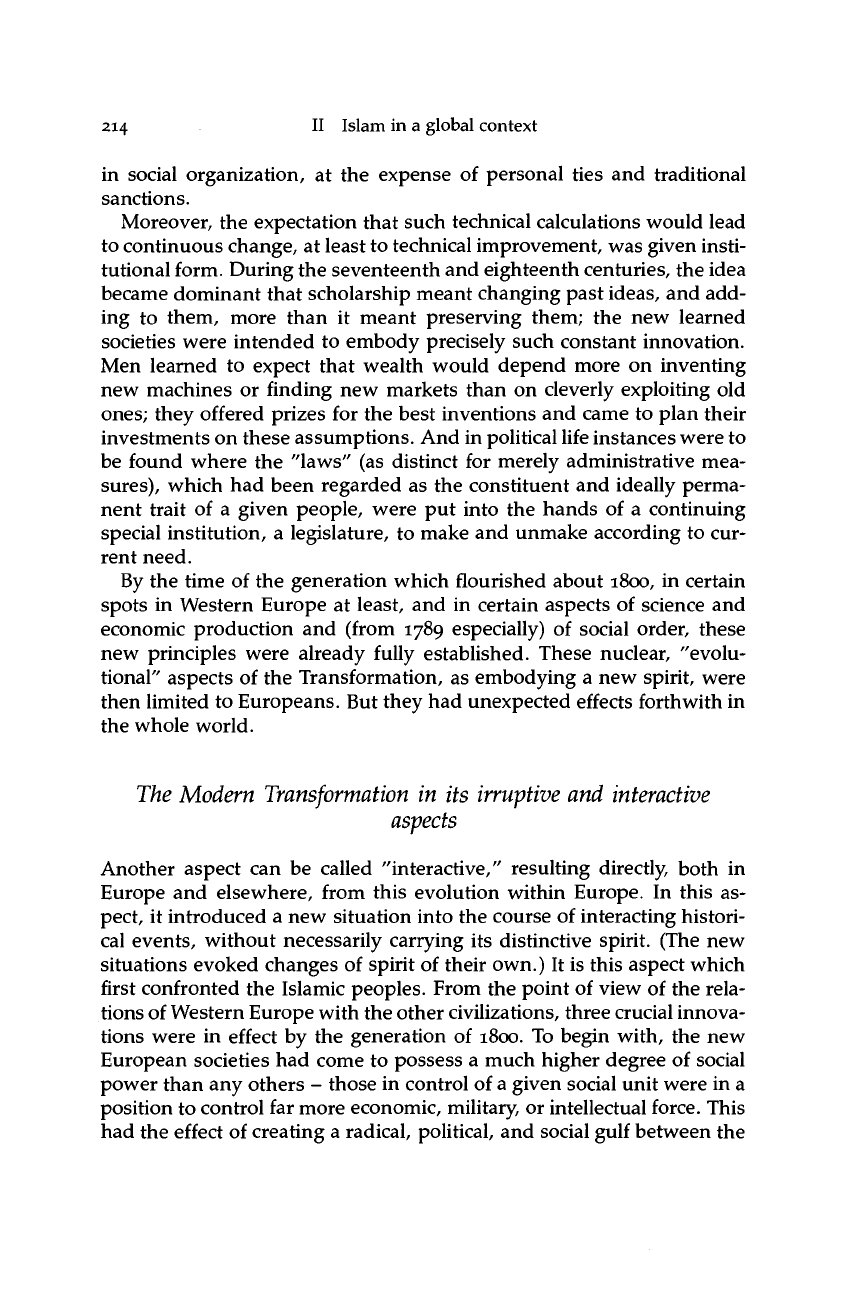
214 II Islam in a global context
in social organization,
at the
expense
of
personal ties
and
traditional
sanctions.
Moreover,
the
expectation that such technical calculations would lead
to continuous change,
at
least to technical improvement, was given insti-
tutional form. During the seventeenth and eighteenth centuries, the idea
became dominant that scholarship meant changing past ideas,
and add-
ing
to
them, more than
it
meant preserving them;
the new
learned
societies were intended
to
embody precisely such constant innovation.
Men learned
to
expect that wealth would depend more
on
inventing
new machines
or
finding
new
markets than
on
cleverly exploiting
old
ones;
they offered prizes
for the
best inventions
and
came
to
plan their
investments
on
these assumptions. And
in
political life instances were
to
be found where
the
"laws"
(as
distinct
for
merely administrative
mea-
sures),
which
had
been regarded
as the
constituent
and
ideally perma-
nent trait
of a
given people, were
put
into
the
hands
of a
continuing
special institution,
a
legislature,
to
make
and
unmake according
to cur-
rent need.
By
the
time
of the
generation which flourished about 1800,
in
certain
spots
in
Western Europe
at
least,
and in
certain aspects
of
science
and
economic production
and
(from
1789
especially)
of
social order, these
new principles were already fully established. These nuclear, "evolu-
tional" aspects
of the
Transformation,
as
embodying
a new
spirit, were
then limited
to
Europeans. But they
had
unexpected effects forthwith
in
the whole world.
The Modern Transformation
in its
irruptive
and
interactive
aspects
Another aspect
can be
called "interactive," resulting directly, both
in
Europe
and
elsewhere, from this evolution within Europe.
In
this
as-
pect,
it
introduced
a new
situation into
the
course
of
interacting histori-
cal events, without necessarily carrying
its
distinctive spirit.
(The new
situations evoked changes
of
spirit
of
their own.)
It is
this aspect which
first confronted
the
Islamic peoples. From
the
point
of
view
of the
rela-
tions
of
Western Europe with the other civilizations, three crucial innova-
tions were
in
effect
by the
generation
of
1800.
To
begin with,
the new
European societies
had
come
to
possess
a
much higher degree
of
social
power than
any
others
-
those
in
control
of a
given social unit were
in a
position
to
control
far
more economic, military,
or
intellectual force. This
had
the
effect
of
creating
a
radical, political,
and
social gulf between
the

io Modernity and the Islamic heritage 215
Europeans and all others, who were in effect at the mercy of any con-
certed effort the Europeans might make. (This gulf corresponded in
some ways, in fact, to that between even the earliest urban societies and
primitive tribes - in the introduction of civilization, likewise, there was
an accompanying acceleration of the pace of history.)
Secondly, this gulf became the most important single fact of life for the
non-European societies because of a natural trait of the great technical
transformations: the exploitation of ever-new technical possibilities al-
most by definition drew no boundary lines - in the search for goods,
resources and markets, the Europeans rapidly became intimately depen-
dent upon conditions at the farthest corners of the globe. In conse-
quence, the Europeans came to have a vital interest in affairs everywhere
and, having both interest and power, moved, during the generation
around 1800 (and almost unwillingly) into effective domination of the
greater part of the civilized world - India and Malaysia being conquered
outright (before then, Europeans had controlled chiefly port towns at
most),
and the rulers of the Middle East being forced to hinge all their
policies on the presence and character of the new West. Soon, closing
the gulf between the West and others became the preoccupying goal
everywhere.
Finally, the new European societies were changing, and increasing
this crucial social power, at an enormously faster rate than that at which
the other societies of the Afro-Eurasian zone had been accustomed to
change and were still changing. The gulf kept widening. This had the
effect, for the world at large, of laying down sharp conditions under
which alone the political gulf might possibly be closed. Development
must no longer proceed at the old pace; that is, any independent local
transformation of the kind, which might have been in the offing given
another five hundred years, could not be awaited. The Transformation
must be taken up in the form in which it had appeared in Europe, and it
must, moreover, be taken up with far greater rapidity, and, therefore, in
some drastically different manner, if the ever-increasing gulf in social
power were to be closed. This was the initial meaning of the Modern
acceleration of history for most of the world: a terrible pressure of time in
the face of the transformed West.
While the interpretation of the Great Western Transformation, and
with it of the Modern acceleration of history, as a natural stage for all
peoples is in some ways an improvement over a purely Occidentalist
interpretation, it is still radically deficient. One can think of the Transfor-
mation as a natural destiny, awaiting its proper time as the various
peoples evolve into readiness for it, only if one limits it to its "evolu-
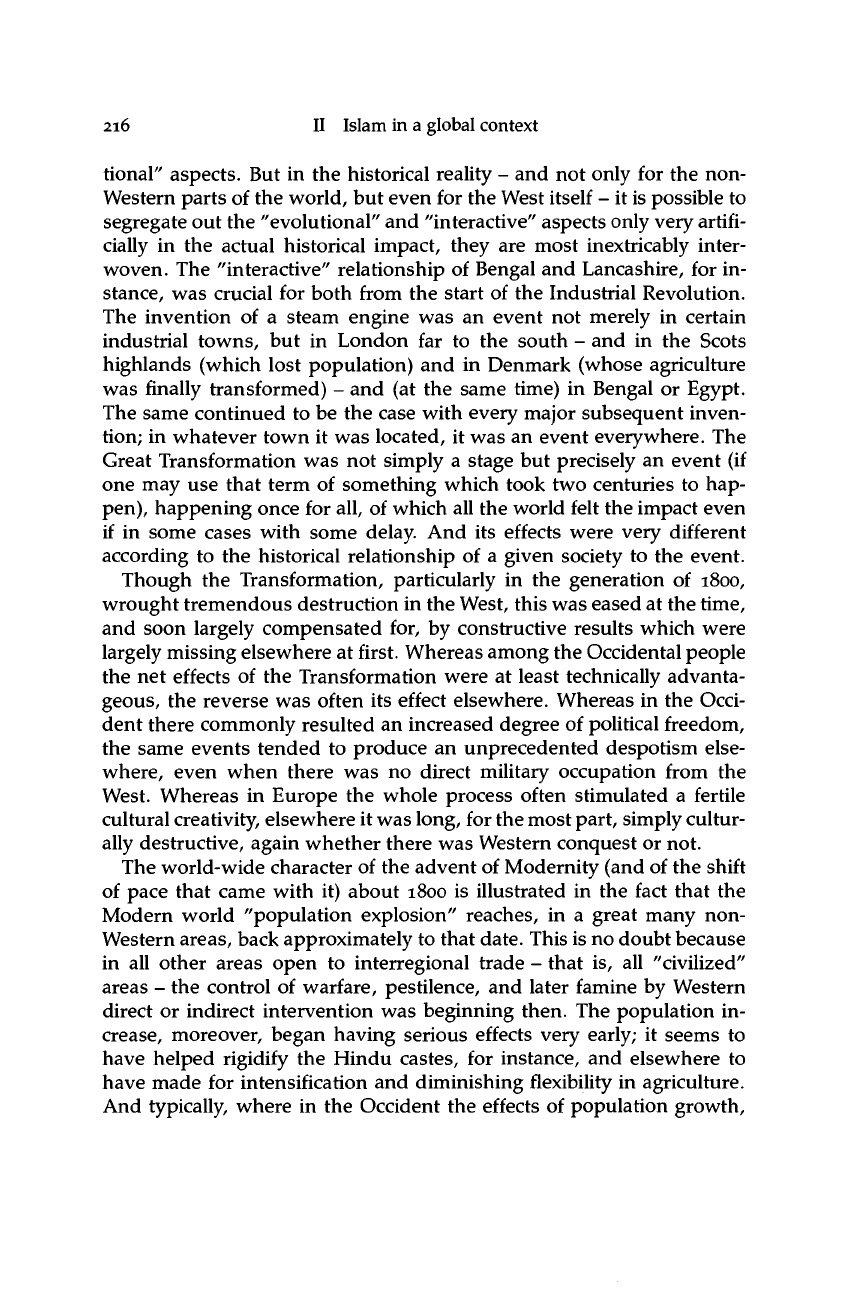
2i6 II Islam in a global context
tional" aspects. But in the historical reality - and not only for the non-
Western parts of the world, but even for the West itself - it is possible to
segregate out the "evolutional" and "interactive" aspects only very artifi-
cially in the actual historical impact, they are most inextricably inter-
woven. The "interactive" relationship of Bengal and Lancashire, for in-
stance, was crucial for both from the start of the Industrial Revolution.
The invention of a steam engine was an event not merely in certain
industrial towns, but in London far to the south - and in the Scots
highlands (which lost population) and in Denmark (whose agriculture
was finally transformed) - and (at the same time) in Bengal or Egypt.
The same continued to be the case with every major subsequent inven-
tion; in whatever town it was located, it was an event everywhere. The
Great Transformation was not simply a stage but precisely an event (if
one may use that term of something which took two centuries to hap-
pen),
happening once for all, of which all the world felt the impact even
if in some cases with some delay. And its effects were very different
according to the historical relationship of a given society to the event.
Though the Transformation, particularly in the generation of 1800,
wrought tremendous destruction in the West, this was eased at the time,
and soon largely compensated for, by constructive results which were
largely missing elsewhere at first. Whereas among the Occidental people
the net effects of the Transformation were at least technically advanta-
geous,
the reverse was often its effect elsewhere. Whereas in the Occi-
dent there commonly resulted an increased degree of political freedom,
the same events tended to produce an unprecedented despotism else-
where, even when there was no direct military occupation from the
West. Whereas in Europe the whole process often stimulated a fertile
cultural creativity, elsewhere it was long, for the most part, simply cultur-
ally destructive, again whether there was Western conquest or not.
The world-wide character of the advent of Modernity (and of the shift
of pace that came with it) about 1800 is illustrated in the fact that the
Modern world "population explosion" reaches, in a great many non-
Western areas, back approximately to that date. This is no doubt because
in all other areas open to interregional trade - that is, all "civilized"
areas - the control of warfare, pestilence, and later famine by Western
direct or indirect intervention was beginning then. The population in-
crease, moreover, began having serious effects very early; it seems to
have helped rigidify the Hindu castes, for instance, and elsewhere to
have made for intensification and diminishing flexibility in agriculture.
And typically, where in the Occident the effects of population growth,
